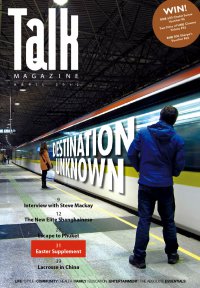Chengdu: A Taste of Sichuan

James Weir
Known around the world as the capital of Sichuan food, the home of a large portion of the world’s pandas and one of the major gateways to Tibet and southern China, the Chengdu of today bears little resemblance to the Chengdu of old, with new developments replacing historical areas of the city at a blistering pace. But the rapidly changing city nonetheless possesses a smorgasbord of opportunities for the long term China expat and the transient tourist alike, continuing to unabashedly barrel into a neon-tinged future that is one part construction dust, one part new car smell and one part zhuyeqing tea.
One of the most enduring traditions of Chengdu is the food, and the most distinct trait of the local cuisine is the Sichuan peppercorn. It is small, brownish-red and looks a bit like those spiky, under-water mines you see in war movies. It will confound the unsuspecting taste bud. The pepper (which is not actually a pepper at all, but a fruit from certain species of deciduous trees) has a numbing effect, and is used to offset the fiery flavours of Sichuan cuisine. This numbing effect allows for unimpeded consumption on a scale that can often border on gluttonous – it’s tough to hold back when it tastes so good and you can’t tell your mouth is undergoing torture.
And the pandas. Oh, the pandas! Images of fuzzy, smiling pandas chomping on bamboo are ubiquitous around the globe. Their continued struggle to reproduce and thrive in nature has only added to their mystique; Chengdu, the rest of Sichuan and the world would be devastated by the loss of the cuddliest bear around. There are scores of panda preservation reserves and centres for propagation-based research across the region. The Chengdu Research Base for Giant Panda Breeding has almost 100 pandas on site with a staff devoted to what essentially amounts to the panda version of Match.com. Volunteering at a panda reserve can be truly rewarding (dung-shoveling aside), and there’s no shortage of such programs across the province. But be aware – your heart may shatter into a million pieces if you catch one of them sneezing, yawning, or doing something else equally endearing.
Another treat Chengdu offers that many of the bigger Chinese cities don’t is unparalleled access to some of the most beautiful terrain in the country. With a major airport, significant bus infrastructure and a healthy rail presence, getting to Chengdu and beyond has never been easier. Take a break from the city and grab a bus to Leshan, where you’ll find the largest Buddha in the world gazing towards Emei Shan, an enormous mountain with a wide berth and an undulating spine that stretches towards the skyline. Spend a day or three exploring the area; its mountainsides are littered with winding stone staircases, well-trodden paths and Buddhist temples. Stand on a mist-shrouded peak and feel good about the world.
Dujiangyang is easily accessible by high-speed train, at only half an hour outside of the city, and cheap, at less than RMB 20 for a train ticket. Once you get there, you’ll want to head to the Nan Qiao Bridge, a structure that dates back to the Ming Dynasty and spans the gushing Min River. On either side you’ll find restaurants, teahouses and more than just a taste of the local culture. Nearby is the site of the ancient Dujiangyang Irrigation Project, an enormous undertaking completed well over 2,000 years ago. One of history’s most ambitious and successful irrigation projects, it not only made over 5,000 square kilometres of arable land, but also halted the seasonal occurrence of devastating floods and made Sichuan the booming agricultural region it is today.
One stop past Dujiangyang on the high-speed train is Qingcheng, a beautiful mountain with temples scattered along paths that wind upwards through bamboo groves and thick greenery. Many of the temples were destroyed during the 2008 earthquake and are in various states of reconstruction. Amazingly, the White Cloud Monastery at the top of the mountain managed to avoid any major damage, lending credence to the old saying “they don’t make ‘em like they used to.”
James Weir is an editor for ChinaTravel.net., a sister site to Ctrip.com. Ctrip is offering a range of Chengdu deals and packages, with cheap flights, low hotel rates and great activity discounts. From now until the end of March, all Chengdu Hotel + Activity packages come with a free half-day Panda Research Base tour! Check out www.pages.english.ctrip.com/Chengdu for details, a destination guide and some great Chengdu videos.

